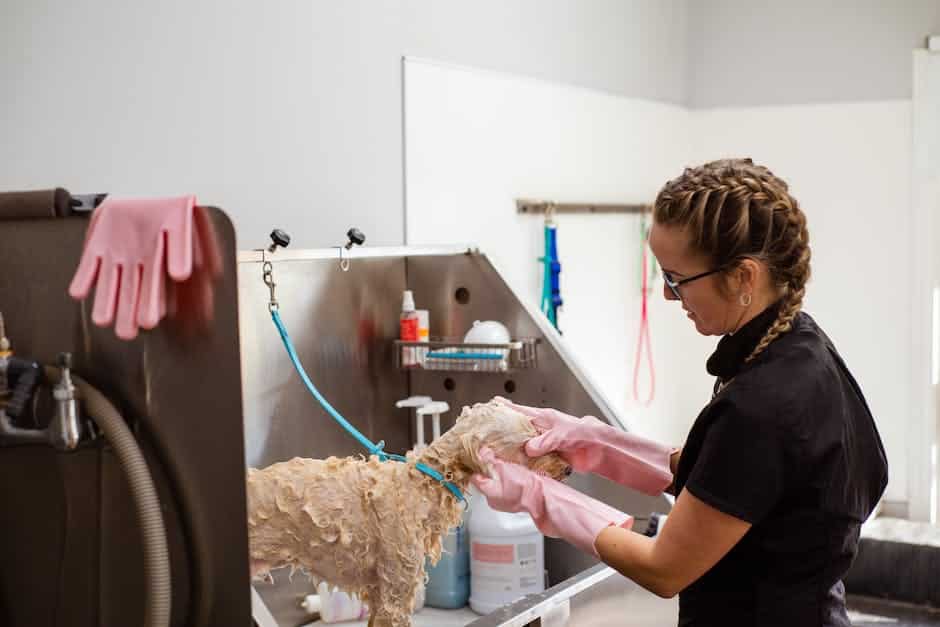
Watching your beloved canine companion incessantly scratch and whimper is a distressing experience for any pet parent. Itchy skin in dogs, known scientifically as pruritus, is one of the most common reasons for veterinary visits and elicits a profound effect on their quality of life. The quest to alleviate your furry friend’s discomfort begins by peeling back the layers of complexity behind this vexatious condition.
This exploration will journey through the labyrinth of causes such as parasitic woes and clandestine allergies, probe the arsenal of home concoctions and store-bought soothers, and underscore the pivotal moments when professional intervention becomes paramount. Additionally, we’ll traverse preventative measures that guard against the recurrence of such dermal distress. Embark on this path to understanding and combating itchy skin, and arm yourself with the knowledge to restore your dog’s well-earned reprieve from relentless scratching.
Understanding the Causes of Itchy Skin in Dogs
Understanding the Itch: Uncovering the Causes Behind Canine Discomfort
When it comes to our four-legged friends, seeing them scratch persistently can be a cause for concern and begs the question: What triggers itching in dogs? It’s crucial for pet owners to identify the root of this incessant scratching, as it can range from a mild annoyance to an indicator of an underlying health issue.
Common Culprits of Canine Itching
Fleas: Enemies in Small Packages
The mere mention of fleas can make any pet owner’s skin crawl. These tiny ectoparasites thrive on your dog’s skin, feeding on their blood and causing an allergic reaction known as flea allergy dermatitis (FAD). One flea bite can trigger intense itching, typically around the tail base, and can lead to secondary skin infections.
Allergies: Pesky and Prevalent
Allergies are another prime suspect in the itching game. Just like humans, dogs can develop allergies to a plethora of environmental factors such as pollen, mold, dust mites, or certain ingredients in their food. Allergic reactions manifest as itchy skin, often accompanied by redness, swelling, and chronic ear infections.
Skin Infections: When Microbes Attack
Dogs can experience skin infections caused by bacteria or yeast, which can exacerbate itching. These infections can produce an unpleasant odor and often require medical treatment. It’s essential to tackle these infections head-on to grant relief to your pup and prevent further complications.
Dry Skin: An Itchy Issue
Dry skin isn’t just a human problem; it’s also a common cause of itching in dogs. Several factors may contribute to dry, flaky skin, including low humidity, nutritional deficiencies, or frequent bathing. Ensuring your dog has a balanced diet and is groomed with suitable products can help combat dry skin.
Parasites: More than Just Fleas
Beyond fleas, other parasites such as ticks, mites, and lice can lead to severe itching and discomfort. Sarcoptic mange mites, for instance, burrow into the dog’s skin, causing intense itching and leading to hair loss and skin thickening. Prompt and appropriate treatment is vital to relieve your dog’s itch and prevent these parasites from spreading.
Addressing the Itch
Effective Flea Control: Winning the Battle Against Pests
To combat flea-induced itching, a robust flea control program involving topical treatments, oral medications, and environmental control is essential. Preventing fleas from setting up camp on your dog and in your home is key to keeping the itch at bay.
Allergy Management: A Multifaceted Approach
If allergies are the itch instigator, identification and management are critical. Working with a veterinarian to pinpoint the exact allergens can lead to customized treatments such as hypoallergenic diets, allergy shots, or medication that can reduce the symptoms and improve your dog’s quality of life.
Proactive Skin Care: Nourishing From the Inside Out
Enhancing your dog’s diet with omega-3 fatty acids can promote healthier skin and a lustrous coat, reducing the chances of developing dry skin. Regular grooming and the use of moisturizing shampoos can also help maintain skin hydration.
Preventative Measures: Keeping Pesky Parasites at Bay
Staying vigilant about your dog’s exposure to areas with a high risk of parasites and maintaining regular check-ups with your vet for preventative treatments is crucial for keeping mites, ticks, and lice away from your canine.
In conclusion, itching in dogs can stem from a mix of factors, including parasites, allergies, infections, and environmental conditions. Understanding the various triggers can help pet owners identify the best course of action to take. The journey to alleviate your dog’s itch begins with awareness and is a testament to the commitment to ensuring their comfort and well-being.
Home Remedies and Over-the-Counter Solutions
Understanding and Treating Canine Itchy Skin with Home Remedies
Soothing an itchy pooch doesn’t have to involve a trip to the vet every time. With a bit of know-how and some simple home solutions, dog owners can provide relief for their furry companions’ uncomfortable skin.
One of the first steps in calming itchy skin is to assess the environment. Often, irritants can linger around the home. Regularly washing your dog’s bedding in hypoallergenic detergent, and keeping floors and surfaces free from dust and dander, can curtail irritating factors.
Another common culprit of itchy skin is a poor diet. Dogs may itch less when fed a balanced diet that includes essential fatty acids. Consider incorporating omega-3 supplements or offering foods rich in these nutrients, such as flax seeds or salmon oil. These nutrients support skin health, leading to a more vibrant coat and less irritation.
For topical relief, oatmeal baths stand out as a time-honored remedy. This gentle approach allows for naturally occurring compounds in oatmeal to soothe skin. Crafting a homemade oatmeal bath is easy; simply grind plain oats into a fine powder, sprinkle them into a warm bath, and let your dog soak for relief.
Another useful topical treatment is aloe vera. This plant is renowned for its healing properties, and when applied to your dog’s skin, it provides cooling relief. Ensure that any aloe vera used is free from added ingredients such as fragrances or alcohol, which could exacerbate the itching.
Let’s also talk about hydration. Ensuring your dog is getting enough water is crucial since hydrated skin is less prone to dryness and irritation. Having multiple bowls of fresh water available and encouraging your dog to drink throughout the day supports skin elasticity and resilience.
Implementing these home remedies can significantly alleviate a dog’s itchy skin. Yet if symptoms persist or your pup’s itching seems to be causing undue distress, consulting with a veterinarian is encouraged. These strategies are not a substitute for professional advice but serve as complementary to the care your vet provides. Remember the key is consistent care and attention to what’s best for your four-legged friend.

When to See a Vet and What to Expect
Detecting When It’s Vet Time: Signs That Shouldn’t be Ignored
Caring for a furry companion is a rewarding experience that brings endless joy and companionship. As dedicated pet owners know, part of loving these four-legged friends involves being vigilant about their health and well-being. Often, our pets communicate through subtler signs, and it’s crucial to recognize when these signs point to a more serious concern that requires veterinary attention.
When Behavioral Changes Ring Alarms
Significant alterations in normal behavior are red flags that shouldn’t be overlooked. If a dog, known for its boundless energy and love for play, suddenly becomes lethargic or disinterested, this could signal that all is not well. This change could range from a general malaise to specific issues like joint pain or internal discomfort.
When Appetite Takes a Downward Spiral
Another telltale indicator is a loss of appetite. When a usually voracious eater turns their nose up at meals, it’s time to consider possible causes. This could be due to gastrointestinal issues, dental pain, or something more systemic. Persistent refusal to eat or noticeable weight loss necessitates a thorough evaluation by a veterinarian.
When Potty Patterns Shift
Keep an eye on potty patterns, too. Increased frequency in urination or a struggle to relieve could imply urinary tract infections or kidney issues. Alternatively, bouts of diarrhea or constipation speak volumes about digestive health and should prompt a consultation, especially if these symptoms continue or are accompanied by vomiting.
When Dog Breath Goes Beyond Dog Breath
Dental health is another aspect not to be sniffed at. Bad breath can be a hallmark of plaque buildup or even gum disease. Regular dental checkups can prevent many of these issues, but a sudden onset of foul odor merits a vet’s review to head off potential oral health issues.
When the Scratch is More than Surface Deep
Though the initial segment of this piece delved deep into the itches and scratches of canine life, it’s important to reiterate the seriousness of persistent scratching. If all preventive measures and treatments have been exhausted, yet the itch persists, it is a stark indication that professional intervention is required. It might be a deeper skin issue or something internal that is showing up through skin reactions.
When Mobility Becomes a Challenge
Trouble getting up, stiffness while walking, or a reluctance to climb stairs are signs of potential joint or bone problems, such as arthritis. While youth can provide a shield against such ailments, no dog is entirely immune. Early vet
intervention can lead to better management of such conditions, especially in larger or older dogs.
When the Eyes and Ears Speak of Trouble
Clear eyes and clean ears are hallmarks of good health. Any discharge, redness, or excessive tearing are reasons for a check-up. Similarly, ears that seem to trouble our pets, causing them to shake their heads frequently or paw at their ears, might indicate infection or even ear mites.
In the End, Trust the Gut
Ultimately, no one knows a beloved pet better than its caregiver. If instincts tell that something is awry, it’s wise to listen. Preventive care and prompt attention to potential problems can mean the difference between a simple remedy and a more complex treatment down the road. So, while this guide has covered integral points, remember that this admirably resilient friend depends on vigilant observation and love that promptly responds to discomfort and pain.
Ready the leash; it might be time for a vet visit to keep that tail wagging healthily.

Prevention Strategies for Itchy Skin in Dogs
Prevention of Itchy Skin in Dogs Through Grooming and Lifestyle Adjustments
When it comes to our furry friends, watching them scratch incessantly is heart-wrenching. Granted, a little scratch here and there is normal, but when it turns into a relentless pursuit to quell an itch, it’s clear there’s an underlying issue at paw. To keep those pesky itchy episodes at bay, let’s consider grooming and lifestyle adjustments that make a difference.
Grooming: More Than Just a Pretty Face
Regular brushing is more than just a beauty routine. It’s a frontline defense against itchy skin in dogs. Brushing distributes natural oils across the fur, maintaining moisture levels in the skin, and preventing dryness. It also removes loose hair and dander that can cause irritation. What’s more, those bonding moments over a grooming session double as an inspection service, as you can get up close and personal with your pooch’s coat, spotting any troublesome areas before they escalate. For dogs with longer or dense coats, it’s essential to keep matting at bay – because tangled fur isn’t just unsightly; it can trap moisture and debris, leading to irritated skin.
Lifestyle: A Wholesome Approach
A holistic stance toward our dog’s lifestyle can keep itching in check. Exercise, believe it or not, isn’t just for fitness – it aids skin health too. Adequate physical activity keeps the blood circulating, ensuring that skin cells are well-nourished, which can prevent skin issues. Don’t forget to rinse off any environmental irritants after a hearty play session outside, especially if your furry pal took a romp in areas treated with chemicals or pesticides.
Inside the home, keeping a clean and hazard-free dwelling is equally pinnacle. Regularly wash your dog’s bedding, as accumulated dirt and dust can trigger skin problems. And while cleanliness is key, hold back on the excessive bath time. Too frequent baths can strip away essential oils that protect their skin, leading to dryness and itching. When baths are necessary, selecting the right shampoo can make all the difference. Opt for mild, soap-free formulas specifically designed for dogs, focusing on those with soothing properties such as chamomile or tea tree oil.
Proactive Measures: Spot and Avoid
Lasty, always stay proactive. While fleas are often the usual suspects when it comes to itching, there’s a world of other potential irritants. Routinely check your dog’s skin for any signs of redness, bumps, or parasites. Should you notice any abnormalities, promptly removing anything that shouldn’t be there – like ticks – can stave off irritation and potential infections.
Knowing what’s normal for your dog’s coat and skin is crucial. Keep a vigilant eye – changes in skin color, texture, or the presence of an unusual odor can all signal a deeper issue needing a veterinarian’s expertise. Remember, the key to preventing itchy skin is not waiting for an itch to strike. By fostering a health-aware lifestyle complete with regular grooming, exercise, and a keen eye for detail, you can often nip itch-inducing conditions in the bud, ensuring your four-legged companion leads a comfortable, itch-free life.

The pursuit to soothe the itchy epidermis of our dogs often mirrors the dedication we invest in maintaining our personal health and well-being. Armed with insights on potential triggers, proactive treatments, and the vital role of veterinary expertise, you can become the champion your canine relies on in their times of discomfort. Remember that each stride taken towards recognizing early signs, embracing preventative measures, and adhering to the guidance of professionals, solidifies the bond with your four-legged friend, ensuring their tail wags with happiness rather than frustration. Grant your dog the gift of comfort and tranquility by implementing the wisdom you’ve gleaned, and watch them thrive in their itch-free, jubilant existence.




